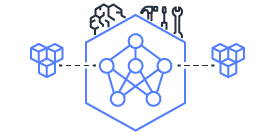This document is relevant for: Trn1, Trn2, Trn3
Integrating a new dataset/dataloader#
In this section, we showcase how to integrate a new dataset/dataloader with the library.
Building Dataset module#
One can use the guide on PyTorch docs
to create a Dataset class.
Building DataModule#
To configure the dataloader, one needs to create a DataModule class. Neuronx Distributed Training library provides
a BaseDataModule which one can use to implement their new DataModule. Create a new file called
new_data_module.py and add the following content.
from neuronx_distributed_training.lightning_modules.data.base import BaseDataModule
class NewDataModule(BaseDataModule):
def __init__(self, cfg, trainer):
"""
DataModule class for configuring the dataset/dataloader
Args:
cfg: `data` cfg in the yaml file.
trainer: PyTorch-Lightning trainer.
"""
super().__init__(cfg, trainer)
# Users can use the cfg argument to pass down
# arguments from the yaml file to the DataModule.
def get_batch_length(self, batch):
"""
Returns the length of the batch.
"""
return len(batch["input_ids"])
def process_global_batch(self, global_batch, global_batch_size=None):
""" Any custom processing of batches can be done here.
Args:
global_batch: list of inputs, eg.[tokens, labels]
global_batch_size: Length of tokens and labels
"""
return global_batch
def train_dataloader(self):
"""
This API should return a torch.utils.data.dataloader.DataLoader object
"""
...
def val_dataloader(self):
"""
This API should return a torch.utils.data.dataloader.DataLoader object
"""
...
def test_dataloader(self):
"""
This API should return a torch.utils.data.dataloader.DataLoader object
"""
...
Plug into training.py#
Once the new data module is created, we can then plug this into the training.py script under examples
folder. We can modify the training.py script as follows:
...
# Assuming we are using the same ModelModule we used for LLama example.
from new_data_module import NewDataModule
data_module = NewDataModule(cfg, trainer)
model = HFLLamaModule(cfg, trainer)
trainer.fit(model, datamodule=data_module)
The rest of the code can remain the same. The trainer will now use the NewDataModule for fetching the
dataloader and run e2e training.
Create config file#
Next, we can create a config file under conf to be used for this new dataloader. We can start with a copy of
hf_llama_7B_config.yaml. Let’s call this config file my_new_config.yaml. We can edit the data key
to configure the DataModule
Note
For the model, we are using the same model that the llama example is using. To configure a new model, please check the Integrating a New Model section.
Launching e2e training#
We can now launch training using the new data_module. This can be done using the following command:
CONF=my_new_config.yaml ./train.sh
This document is relevant for: Trn1, Trn2, Trn3
